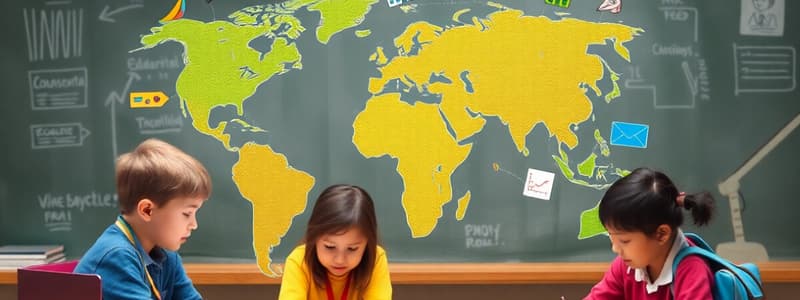Podcast
Questions and Answers
What are the dimensions of the global education system?
What are the dimensions of the global education system?
- Economic growth
- Social development
- Learning skills of twenty-first century (correct)
- Cultural preservation
The global education system is solely focused on economic forces.
The global education system is solely focused on economic forces.
False (B)
What are the three waves of education reform mentioned?
What are the three waves of education reform mentioned?
Effective education movement, Good education movement, Global education movement.
The third-wave paradigm of education focuses on the development of individuals and the ______.
The third-wave paradigm of education focuses on the development of individuals and the ______.
Which of the following is NOT mentioned as a key feature of the third-wave paradigm of education?
Which of the following is NOT mentioned as a key feature of the third-wave paradigm of education?
What is the main goal of the global education movement?
What is the main goal of the global education movement?
What is a primary focus of twenty-first century learning skills?
What is a primary focus of twenty-first century learning skills?
Flashcards are hidden until you start studying
Study Notes
Global Education System
- The global education system is influenced by economic, digital, cultural, demographic, and environmental forces.
- The global education system allows young people to learn to participate in an interconnected world and benefit from diverse cultures.
- The global education system combines various educational systems from different nationalities creating a complex global entity.
- The global education system is addressed through key dimensions:
- Learning skills of the twenty-first century.
- The third-wave paradigm of education.
Twenty-First Century Learning Skills
- Twenty-first-century learning skills include collaboration, critical thinking, and creativity.
- Twenty-first-century skills require radical reforms in education systems.
- Reforms can happen at macro, meso, site, and operational levels.
- Macro - Level Reforms:
- Re-establish new national vision and educational aims.
- Restructure education systems at different levels.
- Restructure market-driving, privatizing, and diversifying education.
- Meso - Level Reforms:
- Increase parental and community involvement in education and management.
- Site - Level Reforms:
- Ensure education quality, standards, and accountability.
- Increase decentralization and school-based management.
- Enhance teacher quality and continuous professional development for teachers and principals.
- Operational - Level Reforms:
- Use information technology in learning and teaching.
- Apply new technologies in management.
- Make a paradigm shift in learning, teaching, and assessment.
Third-Wave Paradigm of Education
- Education reforms have gone through three waves of change:
- Effective education movement.
- Good education movement.
- Global education movement.
- Each wave of educational reform operates within its paradigm, which defines the nature of education and directs initiatives to change educational practices at all levels.
Key Features of the Third-Wave Paradigm of Education
- Assumption about Environment:
- A fast-changing society with globalization and technology advancements.
- A liflong learning and multiple-development society.
- Reform Movements:
- World-Class Education Movements strive for sustainable student and societal development in a globalized world.
- Conception of Effectiveness:
- Future effectiveness emphasizes the development of individuals and society.
- Role of Education Institution:
- Education institutions facilitate sustainable development for students and society through a changing global context.
- Nature of Learning:
- Learning develops contextualized multiple intelligences (CMI) and other twenty-first-century competencies for sustainable development.
- Nature of Teaching:
- Teaching involves facilitating capacity building for the multiple and sustainable forms of development of students.
Studying That Suits You
Use AI to generate personalized quizzes and flashcards to suit your learning preferences.



